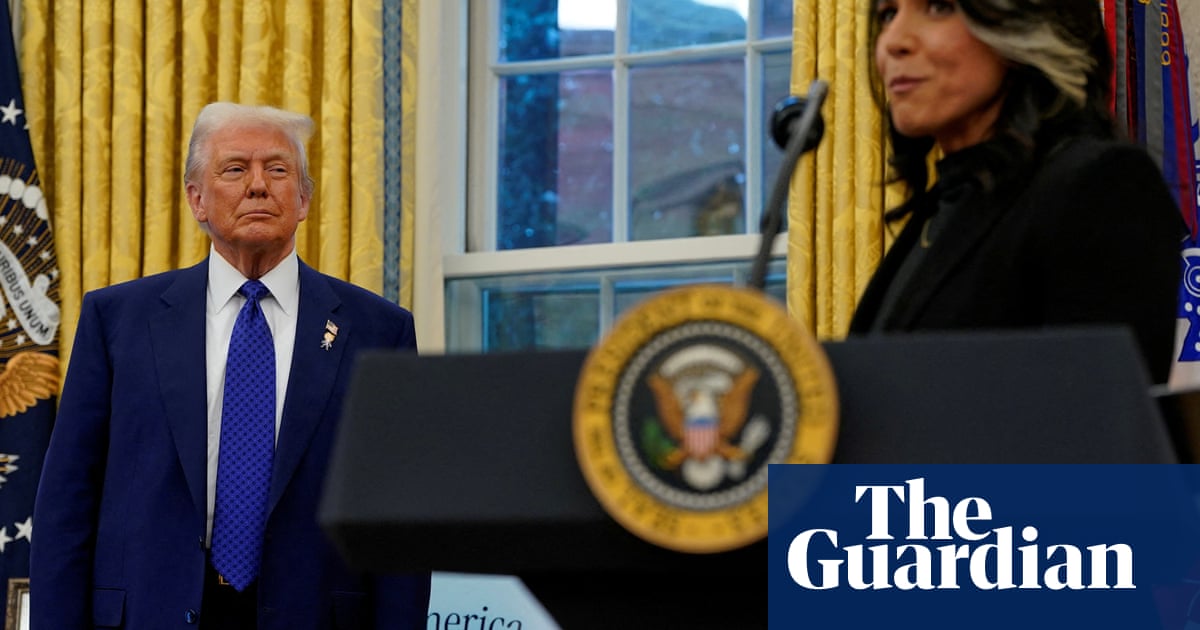The Trump administration is managing internal dissent over deliberations on whether to launch a strike againstIran, breaking what many supporters saw as a campaign pledge not to involve the US in new conflicts in the Middle East.
Trump for the second time this week disregarded testimony by his director of national intelligence, Tulsi Gabbard, that Iran had not been seeking to build a nuclear weapon as of March this year.
“She’s wrong,” Trump said, then added: “My intelligence community is wrong.”
In a striking about-face, Gabbardlate on Fridaysaid her March testimony had been taken “out of context” by the media and claimed there was no difference between her opinion and Trump’s.
“The dishonest media is intentionally taking my testimony out of context and spreading fake news as a way to manufacture division,” she said in a post on X.
“America has intelligence that Iran is at the point that it can produce a nuclear weapon within weeks to months, if they decide to finalise the assembly. President Trump has been clear that can’t happen, and I agree.”
Gabbard wasnominated to her positionin large part because of her skepticism of the US intelligence community and its role in the US involvement in a series of “forever wars” in the Middle East, especially the Iraq war.
Her transition from Democrat to Trump supporter is indicative of the broad coalition that Trump has united under his America First movement – and the potential for a schism as the US grows closer to launching an attack on Iran.
Steve Bannon, an influential advisor who has been critical of the potential for a US-Iran war, was seen having lunch at the White House with Trump this week, following a series of podcast episodes in which he and other popular MAGA pundits criticised what they saw as preparations for a preemptive US strike against Iran.
Bannon came to lunch armed with talking points that the Iran strike would be a bad idea and the massive 30,000lb bunker-buster bombs that could target the Iranian uranium enrichment facility at Fordow may not destroy the target.
The Guardian previously reported that Trump was not fully convinced the bombs would destroy the target, and has held off authorising strikes as he also awaits the possibility that the threat of US involvement would leadIranto talks.
Others close to the administration have pushed back forcefully in support of a strike on Iran.
Republican congressmen including Mitch McConnell and Tom Cotton have lashed out against the isolationist wing of Trump’s support; the radio host Mark Levin has personally spoken with Trump in support of stronger backing for Israel; and other top members of the administration – including secretary of state Marco Rubio – are avowed Iran hawks.
Others, such as vice-president JD Vance, are public anti-interventionists but have limited their criticism of potential strikes to allow Trump the space to make a decision.
But Bannon is believed to have an outsized influence on Trump’s decision-making on the war. According to US media, he has warned Trump he shouldn’t trust Israeli intelligence that the Iranian government was seeking a nuclear weapon imminently.
Others in the MAGA wing of Trump’s support have sought to rebuild ties after sharply criticising Trump’s positioning on the Israeli strikes against Iran. Tucker Carlson, the former Fox News host, had called Trump earlier this week in order to apologise after blasting those advising Trump to launch strikes against Iran as “warmongers.”
“Tucker is a nice guy,” Trump said from the Oval Office on Wednesday. “He called and apologised the other day because he thought he said things that were a little bit too strong, and I appreciated that.”
